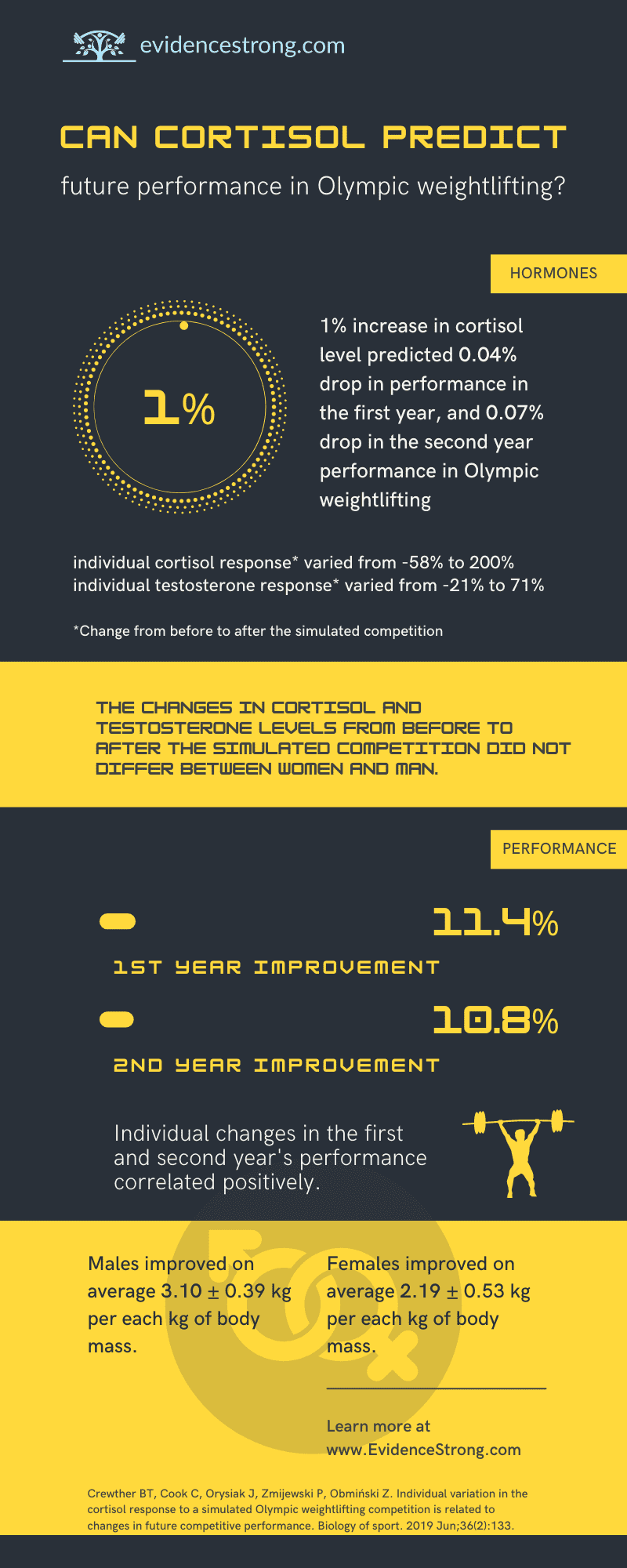Summary of a study on how hormone concentration during simulated competition is correlated with future Olympic weightlifting performance.
Who
70 junior athletes (46 males; total 231±42.6, 24 females; total 138±28.6) aged 18 years with 4.4 years of experience (Poland).
Design
Experimental during simulated competition, then observation for two years.
Outcome measures
- cortisol and testosteron levels before and after a simulated competition
- Olympic weightlifting results from real competitions for the next 2 years
Main results
Performance:
- males improved on average 3.10±0.39 kg per each kg of body mass.
- females improved on average 2.19±0.53 kg per each kg of body mass.
- during the first year, the athletes improved on average 2.89±0.58 kg per each kg of body mass (11.4±7.7% of improvement), and 2.88±0.53 during the second year (10.8±11.6% of improvement).
- individual changes in the first and second year were positively correlated (r=0.71, p<0.001).
Hormones:
- no difference between sexes in cortisol nor testosterone change from before to after the simulated competition
- the individual cortisol response (change from before to after the simulated competition) varied from -58% to 200%.
- the individual testosterone response (change from before to after the simulated competition) varied from -21% to 71%.
- 1% increase in cortisol during the simulated competition predicted 0.04% drop in performance from the group average in the first year, and 0.07% drop in the second year of competing in Olympic weightlifting.
Take home message
For a clinician & coach
1% increase in cortisol level predicted 0.04% drop in Olympic weightlifting performance in the first year, and 0.07% drop in the second year. Changes in cortisol and testosterone levels during simulated competition varied hugely between indivduals. During 2 years, males improved on average 3.10±0.39 kg per each kg of body mass, and females improved on average 2.19±0.53 kg per each kg of body mass.
For a parent
1% increase in cortisol level predicted 0.04% drop in Olympic weightlifting performance in the first year, and 0.07% drop in the second year. Changes in cortisol and testosterone levels during simulated competition varied hugely between indivduals.
For an athlete
1% increase in cortisol level predicted 0.04% drop in Olympic weightlifting performance in the first year, and 0.07% drop in the second year. Changes in cortisol and testosterone levels during simulated competition varied hugely between indivduals.
Original article
Crewther BT, Cook C, Orysiak J, Zmijewski P, Obmiński Z. Individual variation in the cortisol response to a simulated Olympic weightlifting competition is related to changes in future competitive performance. Biology of sport. 2019 Jun;36(2):133.
